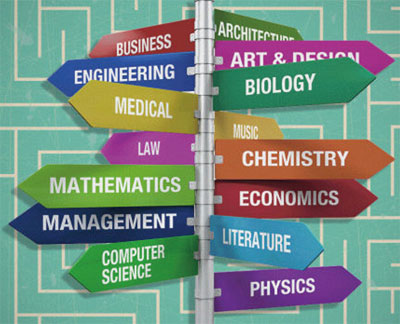College Counseling Advice on Picking a College Major and High Paying Majors
As a Los Angeles college counselor, Pam Ohriner has observed students experience much anxiety when faced with the task of having to pick a college major. If a high school student has a clear idea of the career they wish to pursue, this will make the prospect of putting together a target list of colleges much easier. Students can seek out colleges that offer strong programs in the major or subjects they are interested in. In practicing college counseling, Helping Hand College Guidance also understands that many students are indecisive in their choice of major and prefer to explore numerous options. If you are one of those students, here are some tips that can help you narrow down your choices of a college major:
- What factors are important to me? Are job opportunities or intellectual curiosities of primary importance? Perhaps, a comprise between these two priorities will work for you.
- Where have my interests been centered? Are your extracurricular activities related to a particular academic field? Have you been exposed to any careers that spark your interest?
- Think about your academic strengths and weaknesses. Subjects that you are strong in could support a decision to major in a related field. Likewise, if you have had difficulty in a subject that is required for a major, it is probably a good idea to find a major that i
 s more suitable to your abilities. For instance, if you are considering an engineering career, but math is not one of your strong subjects, it would be better to select something else.
s more suitable to your abilities. For instance, if you are considering an engineering career, but math is not one of your strong subjects, it would be better to select something else. - Think about job prospects using majors that you are considering. If you want to live in a certain geographical area, what industries are most represented? What industries are currently experiencing growth and are in a hiring mode? Do you live in a high cost area where salary is an important consideration? In thinking about a major, it is best to evaluate what skills you will have and what jobs are seeking those skills, as well as the availability of those jobs. For potential salaries and opportunities, these sites can be helpful: https://www.payscale.com/ and https://www.glassdoor.com/index.htm.
- If you are thinking about graduate school, it is worth the time to research what majors and courses would help prepare you for further study. For example, if you are considering medical school, a science major could be helpful (although not required). For
law school, an English, political science, history, or philosophy major could be helpful. - Keep in mind, that most schools do not require you to select a major until sophomore or junior year. There are also many general education requirements that you can fulfill in freshman year. This will afford you the benefit of exploring many academic interests, possibly leading to the discovery of your true passion. In most situations, you can enter as a freshman with your major as “undecided”. However, some majors require many mandatory courses that needed to be started early in your college career to finish within the 4-year time span. Having to add on an extra semester or year beyond the traditional 4 years can add on substantial cost to a degree. Also, certain majors require you to apply directly to their school as a college freshman. Engineering and film schools are examples of such programs. It is important to note that sometimes it can be very difficult to transfer into these programs later as there are limited spaces and strict course requirements.
- If you have numerous interests, consider a double major or having a minor. Some schools will even let you design your own major.
- Some quizzes that can be helpful in selecting a college major are:
https://www.thoughtco.com/college-major-quiz-4089204?quizResult=6ed758b8
https://www.luc.edu/undergrad/academiclife/whatsmymajorquiz/
http://www.marquette.edu/explore/choose-your-major/
If you are still unsure of the direction you would like to go in, attending a college with a large selection of majors will give a student greater flexibility in choice. Also, interviewing professionals in various fields, doing internships in potential areas of interest, taking community college courses, volunteering, and attending special lectures or guest speaker events could offer valuable insights into careers. Students should also reach out to departmental advisors that can offer valuable knowledge into course requirements, academic expectations of a major, as well as internship possibilities in the field.
A Word on Job Salaries
Recent research has indicated what most of us already know. The STEM fields which include science, technology, engineering, and mathematics offer the most promise for high paying jobs after graduation. Most, if not all, offer a starting salary of at least $60,000 a year, with a mid-career salary somewhere around $100,000. These salaries could be somewhat more or less depending on the industry and geographic area. These careers include Actuarial Sciences, Biomedical Engineering, Mechanical and Aeronautical Engineering, Electrical Engineering, Software Engineering, Industrial Engineering, and Physician Assistant Studies. Petroleum Engineering is on the high range of the pay scale for starting salaries. Some non-stem majors that off promising pay are nursing, finance, economics, public health, international business, and accounting. The lower paid majors are often in the fields of psychology, social work, theological studies, education, and animal science.
A Final Word on Majors
The importance in thinking about majors is to make the most out of your college years. As a college counselor, and having also been a student, it is important to note that college is a time of exploration during which our interests can change as we grow through our experiences. It is also advantageous to try to learn all that we can from current students, alumni, faculty, advisors, and professionals in the field, so that we can make educated life decisions. Helping Hand College Guidance is here for you if you would like college counseling in navigating college majors, college applications, or help in writing the college essays. Please feel to contact us at Pamela@helpinghandcollegeguidance.com or call us at 310-733-8433. We look forward to relieving your stress and making the application process successful.







